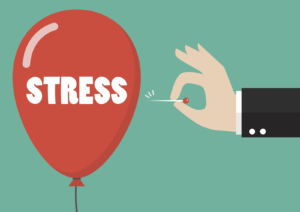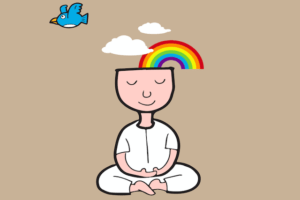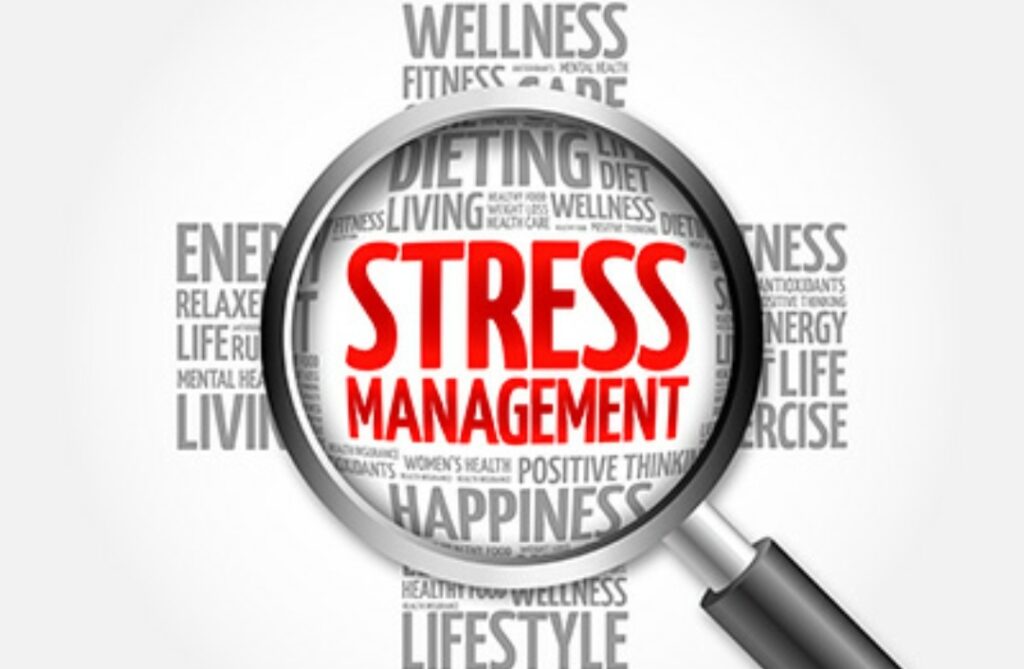Contents
Stress Management

Stress management is the process of managing stressful situations. It can involve different methods, such as relaxation techniques, exercise, and breathing exercises. One of the most important things to remember when trying to manage stress is that everyone reacts differently. What works for one person may not work for another. It’s important to experiment and find what works best for you.
There are a number of different methods that can be used to relax and reduce stress. Some people find that listening to music or reading can help them relax. Others might prefer to do some form of exercise, such as yoga or running. Breathing exercises can also be helpful in reducing stress levels.
It’s important to find what works best for you and to make sure that you’re able to do it regularly. If you don’t find what works, then your stress levels may not decrease.
If you feel that stress is having a negative impact on your life, there are professionals who can help you manage it. It may be useful to talk with your doctor or another health professional if you feel stressed often and it’s having a negative impact.
Signs Of Stress
Stress is a part of life and can be helpful in some situations. Stress may make you feel excited and invigorated, and it may motivate an athlete to drive herself or himself forward. However, too much stress for too long may lead to serious health problems if it leads to depression, anxiety disorders, substance abuse, or other forms of mental illness.
There are many signs of stress. Some common signs are:
- Headaches
- Fatigue
- Muscle tension
- Chest pain
- Upset stomach
- Difficulty concentrating
Types Of Stress
Research has suggested that stress can be either acute or chronic. Acute stress is short-term and associated with “fight or flight.” Symptoms may include-

- Faster breathing
- Heightened awareness
- Increased blood pressure
- Heightened levels of energy hormones in the body
Chronic stress is when stress becomes chronic (has gone on too long) and often leads to health problems. Physical symptoms may include
- Fatigue
- Headaches
- Irritability
- Weight gain due to the effects of cortisol on fat cells
Chronic stress can also lead to psychological issues such as poor concentration and memory, thoughts of suicide, social withdrawal from family and friends, loss of appetite leading to malnutrition or overeating which can lead to obesity, and depression.
Stress Management Techniques
There are many different ways that you can manage your stress. One way is to exercise. Exercise releases endorphins, which have mood-boosting effects. You can also try yoga or meditation, which are both great ways to relax and focus your mind. You can also try deep breathing exercises, which will help you to calm down and focus on the present moment.
Take a look at Quick Stress Relievers

In a few minutes, stress relief strategies can help you feel better. These assist you in feeling better right now. They may perform many tasks such as lowering your body’s stress response or aiding in sleep.
When you are not stressed, you think more about issues and attempt to fix them. Then you have a lower chance of getting upset with people. This can assist maintain your connections healthy. If you’re nipping your stress response in the bud, chronic stress won’t be an issue for you. Quick stress remedies like breathing exercises, for example, might not always help you feel less tense. However, they may relax your body after a scare.
Sleeping well
Sleeping well is one of the best ways to relieve stress. If you are not getting enough sleep, your body could be overworked and overwhelmed by trying to cope with your stress. A lack of sleep can cause people to become irritable, anxious, frustrated, nervous, sad, or depressed. Sleep deprivation can also lead to many health problems such as obesity that may actually exacerbate your stress levels. Make sure you get sufficient rest each night.
If you are having trouble sleeping at night there are some techniques you can use in order to relax and prepare for bedtime. Try taking a bath an hour before going to sleep because it will help relax tense muscles and ease anxiety-producing thoughts from the mind. You should also avoid caffeine and heavy foods late at night because they can lead to painful indigestion.
Some of the most effective stress relief strategies are simple things you do every day, like taking a bath or playing with your pet. If you’re tired, give yourself some time to sleep more. It’ll help you feel better overall, especially if stress is depriving you of your needed rest. Here’s an article that will show how stretching in bed before snoozing can also help.
Hobbies

A hobby is something that interests and engrosses you so much it becomes mindless on its own accord; there are no daily routines involved, their only goal is to relax you.
Stress relief is one of the best possible benefits that any hobby can give you, especially when it allows for your mind to be freed up and expanded into something new. With stress relief in mind, we will continue to examine how a hobby may help alleviate stress and possibly increase productivity as well.
Coping skills
There are three main categories of coping skills: problem-focused coping, emotion-focused coping, and avoidance coping (Cahill). Problem-focused coping is an attempt on the part of an individual to change or eliminate their stressors; this would include things like taking deep breathes when stressed before speaking or doing anything rash (Robertson). Emotion-focused coping includes strategies such as trying not to think about how stressful a situation is in order to find relief from stressors (Robertson).
Avoidance coping includes things such as watching TV or spending more time on the internet when stressed. These avoidant coping methods do help relieve stress and can be an escape, but they do not solve the issue at hand and only serve to delay dealing with the problem directly (Cahill). It is important that we remember that avoidance coping strategies are associated with poorer mental health outcomes than either problem-focused or emotion-focused coping strategies because they tend to prolong stressful feelings and thoughts rather than extinguish them entirely (Cahill).
Connect to Others

The most powerful way to fight off stress is by connecting to others. This can be as simple as sharing your problems with a friend or talking through the issue with someone you trust. Chatting with people about what’s bothering them can be enlightening and therapeutic because you’re distracting yourself from your own thoughts and focusing on someone else’s instead. It may even help solve your problem.
You don’t always have to talk about serious stuff either, something as casual as having lunch together every now and then could also provide some much-needed companionship. Being around other people is cathartic in its own right since it forces us not only to get social fulfillment but also reminds us that whatever we are going through will likely pass soon enough.
The simple act of connecting with others is the best stress relief of all. Whether it be something as big as a friend or family member, or just someone to talk to on a regular basis, building up your support network will help you feel less alone and more capable of dealing with whatever comes your way.
Have Fun

As simple as this sounds, you’d be surprised how many of us forget to do it. We put off our hobbies and neither watch TV nor play games just because we have other things that need doing first. It’s time to stop being so selfless and indulge in a little bit of fun for a change. You can join a sports team, play a board game, or do whatever interests you most.
If nothing else it will help you remember that there is more to life than work and responsibilities. So take a break from your normal routine and try something new for a change!
Stress Relief at the Office
When we’re stressed all we want to do is run somewhere as far away from the source of our troubles as possible… but sometimes this isn’t an option so instead we have to find other ways to cope with stress on the job. Taking some time during the day to clear your mind can be beneficial so go ahead and meditate or breathe deeply during breaks. Or just stand up and stretch every now and then.
You could also try going outside and taking a walk around the office building. This forces you to take your mind off of whatever has been occupying it and can be just as restorative as meditation. Plus, getting some fresh air is always nice!
Have A Coffee

If all else fails there’s nothing wrong with grabbing a cup of coffee from the break room to help steady your nerves. It may seem counterproductive since caffeine is a stimulant, but it will provide you with a temporary way to feel better again by giving yourself an energy boost that will give you confidence about tackling whatever tasks lie ahead of you.
It’s easy for us to tell ourselves that we don’t have time in our daily schedule for relaxation or stress relief activities because we’re too busy with our work, but this is simply not the case. We all have to take some time for ourselves whether it be during a coffee break, an hour at lunchtime, or even just after work every day.
Make sure to find what works best for you and try to do it as often as possible so that when the next stressful event in your life arises you will be better able to handle it without feeling overwhelmed. The more we practice stress management techniques and coping strategies the less powerful they seem and the easier they become in our everyday lives.
Therapy For Stress Management

Therapy can be an extremely effective way of stress management. If you’re struggling with chronic stress, talking to a therapist may be a good option for you. Therapists can help you identify the sources of your stress and give you tools to manage them. They can also provide emotional support and listen to whatever you may be struggling with.
These are the types of therapy a person can usually expect in a stress management program:
1. Cognitive Behavioral Therapy – this type of therapy focuses on how your thoughts and behaviors play into your experience of stress. By changing the way you think about things, you can change the way you react to them, which reduces the amount of stress you feel.
2. Mindfulness-Based Stress Reduction – this is a group program that teaches mindfulness meditation, breathing exercises, and other relaxation skills to help manage stress better. Meditation may be used both to relax and energize yourself, depending on what’s needed at a particular time.
3. Interpersonal Therapy – this form of therapy focuses on relationships with other people as one possible source for your stress. This includes your interactions with family members, coworkers, and romantic partners. The therapist will help you identify problems within your relationships and develop better communication skills so you can improve your relationships.
4. Psychodynamic Therapy – this type of therapy focuses on the connection between hidden conflicts from past experiences and how they may be manifesting as stress in the present day. A therapist using this approach might explore your childhood for stressful situations that still bother you today to give you a better understanding of what’s going on with you now.
5. Mindfulness-Based Cognitive Therapy – as its name suggests, this form of therapy combines mindfulness with cognitive-behavioral techniques to help manage your thoughts as well as feelings of stress.
Conclusion
The conclusion on stress management is that you don’t have to suffer with your symptoms. There are many great ways to reduce stress and live a more fulfilling life. You can learn how in the article above. If you are looking for stress management tips or therapy, then reach out to our team today. And get the best treatment for stress management.
A Word From MantraCare
Your mental health — your psychological, emotional, and social well-being — has an impact on every aspect of your life. Positive mental health essentially allows you to effectively deal with life’s everyday challenges.
At Mantra Care, we have a team of therapists who provide affordable online therapy to assist you with issues such as depression, anxiety, stress, relationship, OCD, LGBTQ, and PTSD. You can take our mental health test. You can also book a free therapy or download our free Android or iOS app.


